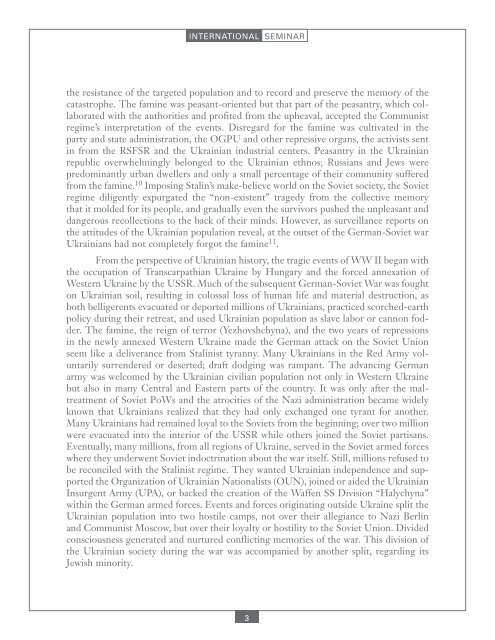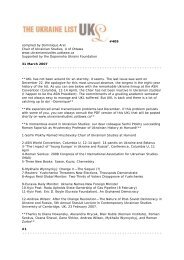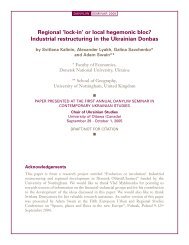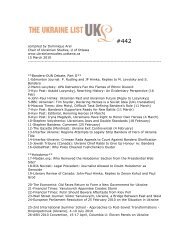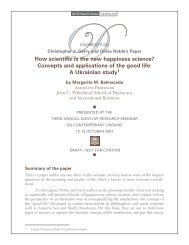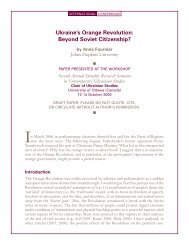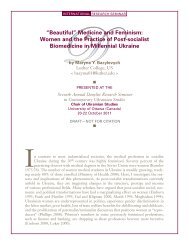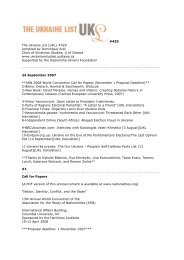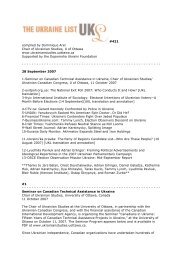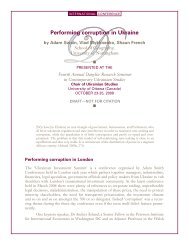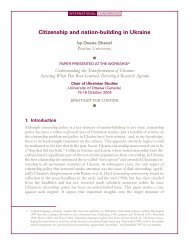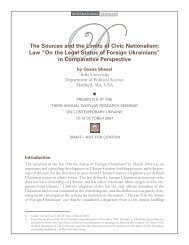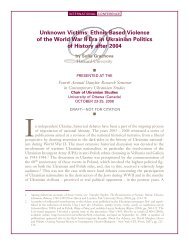Competing Memories Of Communist And Nazi Crimes In Ukraine
Competing Memories Of Communist And Nazi Crimes In Ukraine
Competing Memories Of Communist And Nazi Crimes In Ukraine
Create successful ePaper yourself
Turn your PDF publications into a flip-book with our unique Google optimized e-Paper software.
international SEMINAR<br />
the resistance of the targeted population and to record and preserve the memory of the<br />
catastrophe. The famine was peasant-oriented but that part of the peasantry, which collaborated<br />
with the authorities and profited from the upheaval, accepted the <strong>Communist</strong><br />
regime’s interpretation of the events. Disregard for the famine was cultivated in the<br />
party and state administration, the OGPU and other repressive organs, the activists sent<br />
in from the RSFSR and the Ukrainian industrial centers. Peasantry in the Ukrainian<br />
republic overwhelmingly belonged to the Ukrainian ethnos; Russians and Jews were<br />
predominantly urban dwellers and only a small percentage of their community suffered<br />
from the famine. 10 Imposing Stalin’s make-believe world on the Soviet society, the Soviet<br />
regime diligently expurgated the “non-existent” tragedy from the collective memory<br />
that it molded for its people, and gradually even the survivors pushed the unpleasant and<br />
dangerous recollections to the back of their minds. However, as surveillance reports on<br />
the attitudes of the Ukrainian population reveal, at the outset of the German-Soviet war<br />
Ukrainians had not completely forgot the famine 11 .<br />
From the perspective of Ukrainian history, the tragic events of WW II began with<br />
the occupation of Transcarpathian <strong>Ukraine</strong> by Hungary and the forced annexation of<br />
Western <strong>Ukraine</strong> by the USSR. Much of the subsequent German-Soviet War was fought<br />
on Ukrainian soil, resulting in colossal loss of human life and material destruction, as<br />
both belligerents evacuated or deported millions of Ukrainians, practiced scorched-earth<br />
policy during their retreat, and used Ukrainian population as slave labor or cannon fodder.<br />
The famine, the reign of terror (Yezhovshchyna), and the two years of repressions<br />
in the newly annexed Western <strong>Ukraine</strong> made the German attack on the Soviet Union<br />
seem like a deliverance from Stalinist tyranny. Many Ukrainians in the Red Army voluntarily<br />
surrendered or deserted; draft dodging was rampant. The advancing German<br />
army was welcomed by the Ukrainian civilian population not only in Western <strong>Ukraine</strong><br />
but also in many Central and Eastern parts of the country. It was only after the maltreatment<br />
of Soviet PoWs and the atrocities of the <strong>Nazi</strong> administration became widely<br />
known that Ukrainians realized that they had only exchanged one tyrant for another.<br />
Many Ukrainians had remained loyal to the Soviets from the beginning; over two million<br />
were evacuated into the interior of the USSR while others joined the Soviet partisans.<br />
Eventually, many millions, from all regions of <strong>Ukraine</strong>, served in the Soviet armed forces<br />
where they underwent Soviet indoctrination about the war itself. Still, millions refused to<br />
be reconciled with the Stalinist regime. They wanted Ukrainian independence and supported<br />
the Organization of Ukrainian Nationalists (OUN), joined or aided the Ukrainian<br />
<strong>In</strong>surgent Army (UPA), or backed the creation of the Waffen SS Division “Halychyna”<br />
within the German armed forces. Events and forces originating outside <strong>Ukraine</strong> split the<br />
Ukrainian population into two hostile camps, not over their allegiance to <strong>Nazi</strong> Berlin<br />
and <strong>Communist</strong> Moscow, but over their loyalty or hostility to the Soviet Union. Divided<br />
consciousness generated and nurtured conflicting memories of the war. This division of<br />
the Ukrainian society during the war was accompanied by another split, regarding its<br />
Jewish minority.<br />
3


